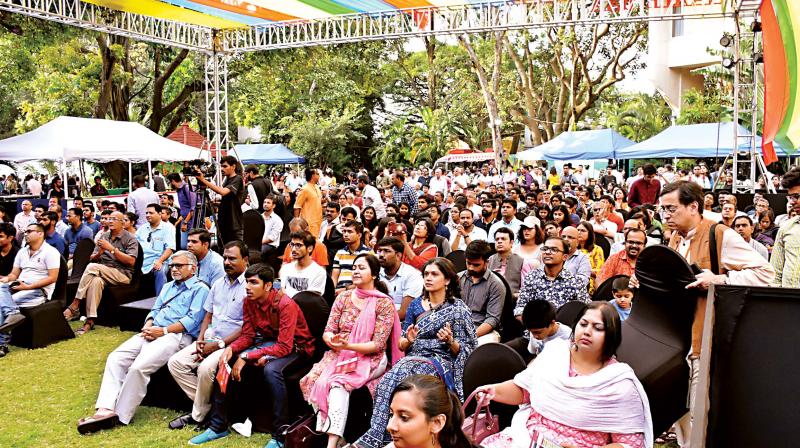Day 1 at Bangalore Literature Festival: Politics kept at bay
It was a chord that would continue through the day, for the seventh edition of the community-organised Bangalore Literature Festival.

Bengaluru: Famously punctual, the Bangalore Literature Festival got off to a start as the clock struck ten, with writer Aatish Taseer and historian Manu Pillai determined to begin even if their audience was no more than five-strong. "There were about 250 people," said a relieved V. Ravichandar, a core member of the BLF team, in an aside to author Vivek Shanbag later that day.
The morning began on a note of philosophy and scholarship, with Aatish and Manu, both evocative speakers. It was a chord that would continue through the day, for the seventh edition of the community-organised Bangalore Literature Festival, boasted a vast variety of writers and perspectives. The words 'equality' and 'caste' were bandied about fairly often but it is a mark of achievement for the festival that politics did not overwhelm the proceedings, as has usually been the case in recent public events across the country. Author Ashwin Sanghi joined Madhavi Mahadevan on the mystifyingly titled 'Naale Ba' stage, while Joshua Mathew brought in a healthy morning dose of nostalgia with Bygone Bangalore at the Red Couch.
Dr David Frawley, the renowned Indologist, took the stage for the rather controversially titled, ‘Why I Became a Hindu’. "There was an article discussing the Aryan Invasion in a prominent magazine, where I was referred to as a well-known fascist," he remarked. "They have overlooked my study of Hinduism, of dharma, yoga, my fight to protect rights of animals I am a fascist, merely for questioning the Aryan invasion." His book, The Myth of The Aryan Invasion, one of many on the subject, has been taken from his own study of Vedanta through Sri Aurobindo, Sri Paramahamsa Yogananda and Sri Ramana Maharishi and his graduation to the Upanishads and the Vedic texts.
"We have to stop thinking of prayer and God through a Western perspective. Hindu dharma recognises the unity of the universe but accepts the diversity of everything within it," he said.
Writer Ranjit Hoskote joined Pulitzer Prize winning poet Vijay Seshadri, who spoke of suffering as a source of art. Through a study of three poems, they explored Vijay's move to the US, the death of his loved ones and his memories of Bengaluru. Solitude resounds in The City of Grief, where Vijay makes a poignant exploration of the void left by the death of his father. The conversation moved on to, as it invariably does, to language, English being Vijay's medium of thought. It was a thread that revived itself with Vivek Shanbhag and Shashi Desphande, the "famously reticent" author, as she described her memoirs. "I write in English but my experiences are in Marathi and Kannada. Marathi especially, for that was my mother tongue. Language plays a very subconscious role in our lives. I for instance, made it a point to speak only Marathi with my own children from the start." Her memoirs, written with careful deliberation, where revelation does not supercede honesty and necessity, are as Vivek Shanbag described, "A
walk through her life, I felt like I was meeting her friends and talking to her about books."
A small circle gathered in one corner by the entrance and parted, momentarily to reveal Udaya Kumar, who has been part of an intensive effort to protect Bengaluru's inscriptions. A replica of the Begur inscription, which contains the oldest mention of Bengaluru and, according to Udaya, "Depicts Bengaluru's first ever citizen," always had a crowd of fascinated onlookers as he patiently went over his explanations. A stack of old televisions playing rather scratchy recordings of the three monkeys: Hear No Evil, See No Evil, Speak No Evil, was Rahul G's take on society's increasing narrow mindedness. He agrees that finding the old televisions was the biggest challenge, "two of them refused to work this morning," he said.
Historian Ramachandra Guha, always a sensation at the Bangalore Literature Festival, took on India and equality to a packed house on Saturday evening.
Perhaps the only complaint, a small one, is that the day was rather sunny, although it was unanimously decided that sunshine always trumps rain!

